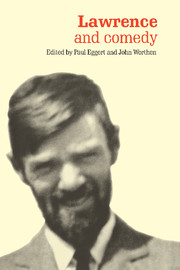Book contents
- Frontmatter
- Contents
- Note on contributors
- Acknowledgements
- Cue-titles
- Introduction
- 1 Drama and mimicry in Lawrence
- 2 Mischief or merriment, amazement and amusement – and malice: Women in Love
- 3 Comedy and hysteria in Aaron's Rod
- 4 D. H. Lawrence and his ‘gentle reader’: The furious comedy of Mr Noon
- 5 ‘Homunculus stirs’: Masculinity and the mock-heroic in Birds, Beasts and Flowers
- 6 Comedy and provisionality: Lawrence's address to his audience and material in his Australian novels
- 7 Lawrence's satiric style: Language and voice in St. Mawr
- 8 Humour in the letters of D. H. Lawrence
- 9 Lawrence to Larkin: A changed perspective
- Index
9 - Lawrence to Larkin: A changed perspective
Published online by Cambridge University Press: 01 March 2010
- Frontmatter
- Contents
- Note on contributors
- Acknowledgements
- Cue-titles
- Introduction
- 1 Drama and mimicry in Lawrence
- 2 Mischief or merriment, amazement and amusement – and malice: Women in Love
- 3 Comedy and hysteria in Aaron's Rod
- 4 D. H. Lawrence and his ‘gentle reader’: The furious comedy of Mr Noon
- 5 ‘Homunculus stirs’: Masculinity and the mock-heroic in Birds, Beasts and Flowers
- 6 Comedy and provisionality: Lawrence's address to his audience and material in his Australian novels
- 7 Lawrence's satiric style: Language and voice in St. Mawr
- 8 Humour in the letters of D. H. Lawrence
- 9 Lawrence to Larkin: A changed perspective
- Index
Summary
For Larkin, as for Lawrence, most writers were frauds. The pair of them were exceptions, because of the way they saw things; and being exceptions constituted their originality as artists. The relationship between them is thus a surprisingly close one, although it also reveals the change in perspective between Modernism and the ‘Movement’, between the literary renaissance of the earlier part of the twentieth century, and the disillusion that followed the Second Wo rid War.
It also demonstrates a paradox: Lawrence the prophet at one in his hatred of fraud with Larkin the solipsist. The writer who is not a fraud must needs be vicious in his honesty.
In a letter to his friend Harry Chambers (9 October 1963) Larkin made a remark about the writer Paul Potts, author of Dante Called You Beatrice. For Larkin the book was ‘quite a testament, though I should run a mile from him the author in reality’. He goes on to ‘wonder if he is as noble & generous & sensitive as he suggests?’ Larkin continues, somewhat significantly: ‘I've always taken comfort from D.H.L.'s “You have to have something vicious in you to be a creative writer.”’ Significantly, because it is typical of Larkin's outlook to put the word ‘vicious’ and the word ‘comfort’ side by side. (Barbara Pym, whose novels Larkin greatly admired, and to whom he wrote many letters, is also fond of using the word ‘comfort’ with a deadpan comic overtone. She suggests that women are in particular need of it, no matter how ‘sharp’ ‘the nicest women’ may be.)
- Type
- Chapter
- Information
- Lawrence and Comedy , pp. 192 - 210Publisher: Cambridge University PressPrint publication year: 1996



